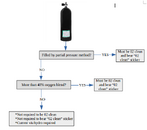It is separated. A PSI VCI can teach the Fill Station Operator class. I teach a FSO class (Fill Station Operator)) for the shop staff - which meets the hazmat recurring training requirement. There is no formal PSI certificate. I keep records of the training for the shop - and print a recognition certificate for the participants.
There is no separation between the hazmat and the psi inspection . the 2 courses are taught together and is covered by the cert you get for PSI VIP. As far as I know you cant take vip without taking the hazmat. Theyare 2 courses but taught together. IOf they teach only hazmat then ill have to believe you on that. The hazmat covers the FSO training. As long as you have are current in the hazmat you can train those in your shop to meed the 3 year retraining rule for hazmat.




